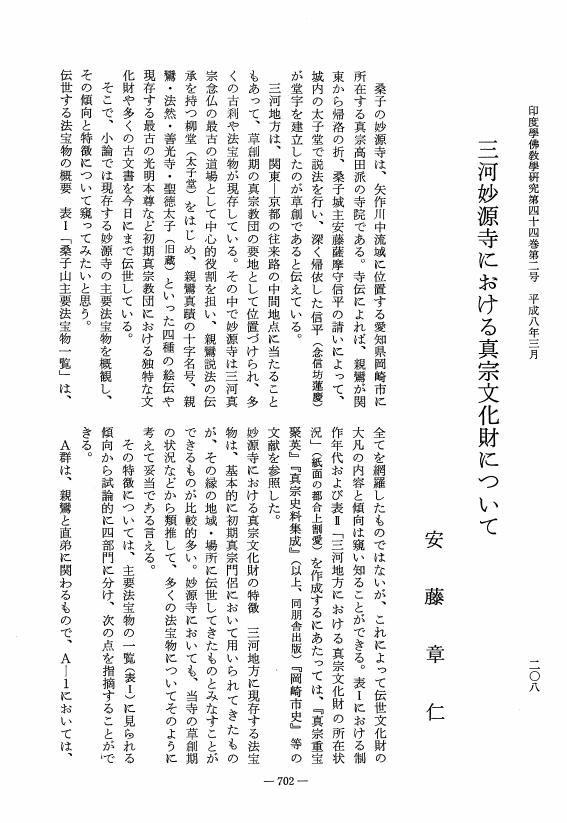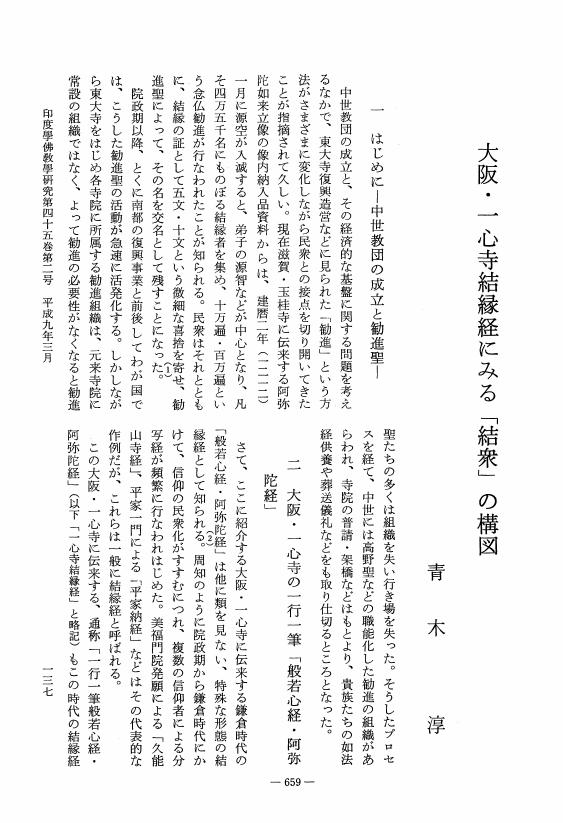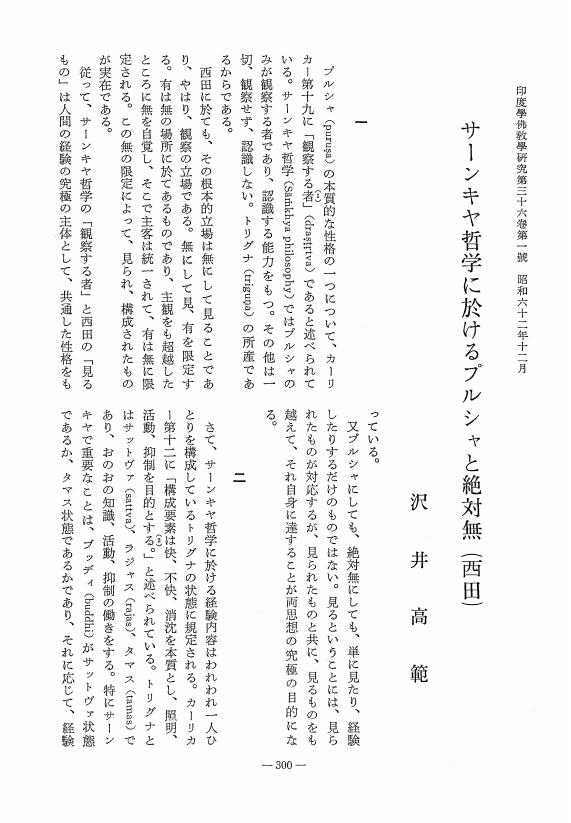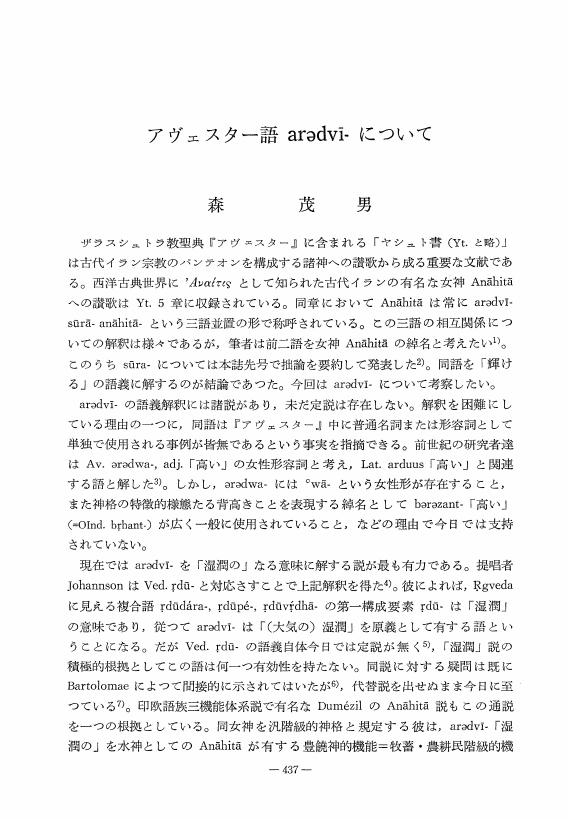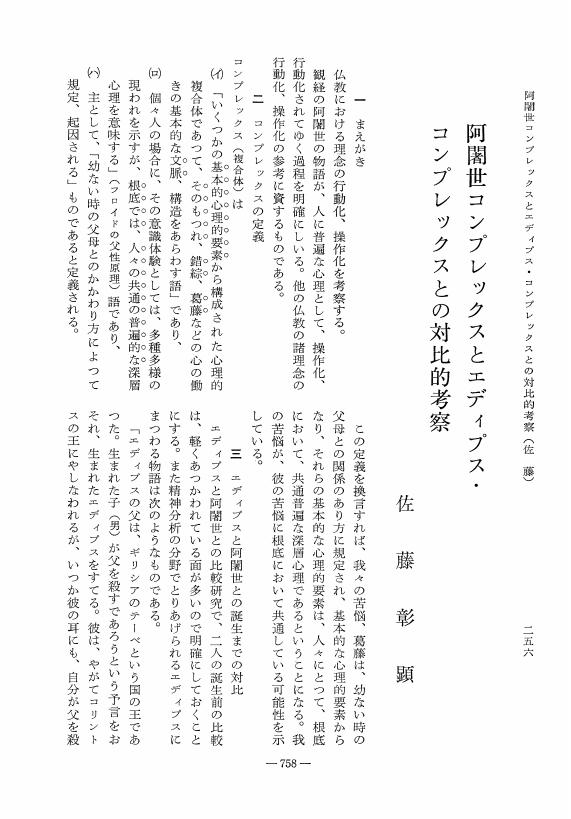1 0 0 0 OA 真言密教における三劫思想について
- 著者
- 加藤 精一
- 出版者
- Japanese Association of Indian and Buddhist Studies
- 雑誌
- 印度學佛教學研究 (ISSN:00194344)
- 巻号頁・発行日
- vol.18, no.1, pp.258-261, 1969-12-25 (Released:2010-03-09)
1 0 0 0 日常語としての<i>papañca-</i>
- 著者
- 坂 英世
- 出版者
- 日本印度学仏教学会
- 雑誌
- 印度學佛教學研究 (ISSN:00194344)
- 巻号頁・発行日
- vol.65, no.1, pp.296-293, 2016
<p>This paper investigates Pāli <i>papañca- </i>focusing on colloquial usage. From the Aṭṭhakathā onward, <i>papañca-</i> is used not only in dogmatic contexts, but also in ordinary contexts. The Saddanīti tells us that <i>papañca-</i> means "a long time" (Sadd 529, 1) in colloquial usage. The nuance of this term, however, is "a waste of time." Parallel cases are found in many passages.</p><p>As a result of this investigation, I conclude that<i> papañca- </i>basically means "a superfluity, a futility" in colloquial usage. <i>Papañceti </i>(denom.) and its paraphrase <i>papañcaṃ karoti </i>also means "do what is unnecessary, make an unnecessary addition to, meddle, etc." The unique temporal meaning is presumably derived from this basic meaning, namely "there is a superfluity for one > one is busily occupied with something, or indulges in something > one wastes one's time." The characteristic syntax in which this term is used includes concrete examples of what is superfluous. In that case, <i>papañca-</i> becomes a complement. </p><p><i>Papañca-</i> in colloquial usage inherits a negative sense of value expression from its dogmatic usage. In spite of showing unique semantic change, it seems that the basic meaning is essentially the same as Classic <i>prapañca-</i> except for the difference in the implied value expressed.</p>
1 0 0 0 OA FAS禅その三
- 著者
- 藤吉 慈海
- 出版者
- Japanese Association of Indian and Buddhist Studies
- 雑誌
- 印度學佛教學研究 (ISSN:00194344)
- 巻号頁・発行日
- vol.27, no.2, pp.539-542, 1979-03-31 (Released:2010-03-09)
1 0 0 0 OA 過去佛について
- 著者
- 平野 眞完
- 出版者
- Japanese Association of Indian and Buddhist Studies
- 雑誌
- 印度學佛教學研究 (ISSN:00194344)
- 巻号頁・発行日
- vol.9, no.2, pp.538-539, 1961-03-31 (Released:2010-03-09)
1 0 0 0 OA クリシュナ信仰とアービーラ族 -マハーバーラタにみられるアービーラ族の検討-
- 著者
- 及川 弘美
- 出版者
- Japanese Association of Indian and Buddhist Studies
- 雑誌
- 印度學佛教學研究 (ISSN:00194344)
- 巻号頁・発行日
- vol.41, no.1, pp.497-495, 1992-12-20 (Released:2010-03-09)
1 0 0 0 OA 宋元版禅籍研究 (一)
- 著者
- 椎名 宏雄
- 出版者
- Japanese Association of Indian and Buddhist Studies
- 雑誌
- 印度學佛教學研究 (ISSN:00194344)
- 巻号頁・発行日
- vol.25, no.1, pp.262-265, 1976-12-25 (Released:2010-03-09)
1 0 0 0 OA 日蓮聖人における太田氏教化の一考察
- 著者
- 奥野 本勇
- 出版者
- 日本印度学仏教学会
- 雑誌
- 印度學佛教學研究 (ISSN:00194344)
- 巻号頁・発行日
- vol.61, no.2, pp.645-648, 2013-03-20 (Released:2017-09-01)
1 0 0 0 OA 親鸞思想における成仏の意義について
- 著者
- 弘中 照夫
- 出版者
- Japanese Association of Indian and Buddhist Studies
- 雑誌
- 印度學佛教學研究 (ISSN:00194344)
- 巻号頁・発行日
- vol.52, no.1, pp.58-60, 2003-12-20 (Released:2010-03-09)
1 0 0 0 OA 三河妙源寺における真宗文化財について
- 著者
- 安藤 章仁
- 出版者
- Japanese Association of Indian and Buddhist Studies
- 雑誌
- 印度學佛教學研究 (ISSN:00194344)
- 巻号頁・発行日
- vol.44, no.2, pp.702-704, 1996-03-20 (Released:2010-03-09)
1 0 0 0 OA 近世初期の関東古義真言宗の本末制度の一考察
- 著者
- 宇高 良哲
- 出版者
- Japanese Association of Indian and Buddhist Studies
- 雑誌
- 印度學佛教學研究 (ISSN:00194344)
- 巻号頁・発行日
- vol.25, no.2, pp.854-857, 1977-03-31 (Released:2010-03-09)
1 0 0 0 OA 大阪・一心寺結縁経にみる「結衆」の構図
- 著者
- 青木 淳
- 出版者
- Japanese Association of Indian and Buddhist Studies
- 雑誌
- 印度學佛教學研究 (ISSN:00194344)
- 巻号頁・発行日
- vol.45, no.2, pp.659-663, 1997-03-20 (Released:2010-03-09)
1 0 0 0 OA 梵天勧請説話に於けるブッダの沈黙に関する一考察
- 著者
- 岩田 朋子
- 出版者
- Japanese Association of Indian and Buddhist Studies
- 雑誌
- 印度學佛教學研究 (ISSN:00194344)
- 巻号頁・発行日
- vol.53, no.2, pp.887-883, 2005-03-20 (Released:2010-03-09)
1 0 0 0 OA サーンキヤ哲学に於けるプルシャと絶対無 (西田)
- 著者
- 沢井 高範
- 出版者
- Japanese Association of Indian and Buddhist Studies
- 雑誌
- 印度學佛教學研究 (ISSN:00194344)
- 巻号頁・発行日
- vol.36, no.1, pp.300-303, 1987-12-25 (Released:2010-03-09)
- 著者
- 田崎 國彦
- 出版者
- 日本印度学仏教学会
- 雑誌
- 印度學佛教學研究 (ISSN:00194344)
- 巻号頁・発行日
- vol.45, no.2, pp.942-938, 1997
- 著者
- 田崎 國彦
- 出版者
- 日本印度学仏教学会
- 雑誌
- 印度學佛教學研究 (ISSN:00194344)
- 巻号頁・発行日
- vol.37, no.2, pp.559-563, 1989
1 0 0 0 『宝性論』における〈悟りの構造〉-正見と増益・損減をめぐって-
- 著者
- 渡邉 郁子
- 出版者
- 日本印度学仏教学会
- 雑誌
- 印度學佛教學研究 (ISSN:00194344)
- 巻号頁・発行日
- vol.49, no.2, pp.901-897, 2001
1 0 0 0 OA 原始仏教における輪廻並びに無始無明と触に関する考察
- 著者
- 山本 啓量
- 出版者
- Japanese Association of Indian and Buddhist Studies
- 雑誌
- 印度學佛教學研究 (ISSN:00194344)
- 巻号頁・発行日
- vol.25, no.1, pp.184-187, 1976-12-25 (Released:2010-03-09)
1 0 0 0 OA 太賢の戒律思想――特に三聚浄戒と「瑜伽戒」の影響について――
- 著者
- 李 忠煥
- 出版者
- 日本印度学仏教学会
- 雑誌
- 印度學佛教學研究 (ISSN:00194344)
- 巻号頁・発行日
- vol.66, no.1, pp.290-285, 2017-12-20 (Released:2019-01-11)
- 参考文献数
- 5
Taehyun 太賢 commented on the Fanwang-jing 梵網経 in his Pommanggyong kojokki 梵網経古迹記,and saw it as the One Vehicle teaching 一乗教.He accepted the trividhāni śīlāni and included the Precepts for the seven groups of disciples 七衆戒 and the Yogācāra precepts in the precepts of the Fanwang-jing 梵網戒.In addition, he cited the Yogācāra precepts as a basis for the non-transgression 無違犯 of Bodhisattvas.Taehyun is the founder of the Silla Yogācāra School, and it is natural that he quotes Yogācāra precepts. However, he did not comment on the Yogācāra precepts as did Seungjang 勝荘,but cited the Yogācāra precepts as the basis of his commentary.In this study I confirm the characteristics of quotations from the trividhāni śīlāni and Yogācāra precepts in Taehyun’s Pommanggyong kojokki. And I examine how it had an influential relation with commentaries later tham Zhiyi 智顗.I further confirm the location of Taehyun in the history of commentaries on the Fanwang-jing.
1 0 0 0 OA アヴェスター語 aredvi- について
- 著者
- 森 茂男
- 出版者
- Japanese Association of Indian and Buddhist Studies
- 雑誌
- 印度學佛教學研究 (ISSN:00194344)
- 巻号頁・発行日
- vol.26, no.1, pp.437-432, 1977-12-31 (Released:2010-03-09)
1 0 0 0 OA 阿闍世コンプレックスとエディプス・コンプレックスとの対比的考察
- 著者
- 佐藤 彰顕
- 出版者
- Japanese Association of Indian and Buddhist Studies
- 雑誌
- 印度學佛教學研究 (ISSN:00194344)
- 巻号頁・発行日
- vol.27, no.2, pp.758-762, 1979-03-31 (Released:2010-03-09)







